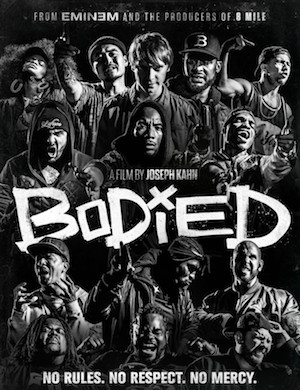[Rating: Minor Rock Fist Down]
A half-Woke fever-dream populated by big ideas and half-finished epiphanies, Bodied is a bad film with a lot of good ideas. A story about a white, privileged, 20-something who allows himself to be swept out into an African-American social current, the movie isn’t as clever as it thinks it is, and sure as hell isn’t as nuanced and insightful as it needs to be to pull off what it’s going for, here.
Bodied opens at an Oakland rap battle, where the audience meets Adam (Calum Worthy), a Literature major doing research for his thesis. Adam approaches one of the battle victors, Behn (Jackie Long), all bubbling with excitement from witnessing first-hand what he’s only read about or seen on YouTube. Adam explains that he’s fascinated by the free-form structure of rap battles and wants to analyze it thru an academic lens to examine 21st century racial, social, and gender constructs. Before he knows it, though, Adam slips into the rap battle circuit himself, and uses academic resources to craft his own “bars” when competing.
There’s a lot of fertile ground to plow with this set-up, as rap battles exist in a special realm where a person is given license to tread upon topics that would normally seem inappropriate or insensitive (and maybe are, anyway). Adam’s position as a white observer and chronicler of a traditionally African-American experience carries a lot of historical baggage, too, and is enough for an interesting set-up all by itself even before he starts battling. Yet whether it is because the script doesn’t know how to approach any of this red-hot material earnestly, or is just afraid to do so, the result is the same: Bodied begins to fall apart almost immediately.
 For starters, there’s Adam: a character with a lot of interesting, progressive ideas, yet with no roadmap about how he’s gotten there. He’s surrounded by pseudo-social justice warriors like his wet-blanket vegan girlfriend, Maya (Rory Uphold), who has varying levels of disinterest and disdain for anyone that doesn’t share her privilege. There’s an attempt to ground Adam’s interest in African-American culture via his dad/professor/thesis advisor/ “probably the most famous literary critic in the country” (Anthony Michael Hall in an utterly wasted role), yet their interactions are brief, and don’t provide the foundation that would explain Adam’s origin story.
For starters, there’s Adam: a character with a lot of interesting, progressive ideas, yet with no roadmap about how he’s gotten there. He’s surrounded by pseudo-social justice warriors like his wet-blanket vegan girlfriend, Maya (Rory Uphold), who has varying levels of disinterest and disdain for anyone that doesn’t share her privilege. There’s an attempt to ground Adam’s interest in African-American culture via his dad/professor/thesis advisor/ “probably the most famous literary critic in the country” (Anthony Michael Hall in an utterly wasted role), yet their interactions are brief, and don’t provide the foundation that would explain Adam’s origin story.
The result of all of this is pretty cartoonish. All of the white people in Adam’s life are smiling racists that “hide” their prejudices by advocating for conspicuously well-spoken, mainstream African American celebrities like LL Cool J and Maya Angelou. They complain about people of color in their gentrified spaces and can’t seem to fathom why Adam would want to spend his time exploring Oakland’s urban culture. Thematically, all of this represents nothing more than a straw man narrative, as Adam’s world and the people in it are so aggressively awful that it would be shocking if they didn’t get their comeuppance (or Adam his redemption).
Ironically enough, it is the rap battles, with all their exaggerated posturing and whimsical prose, that offer up the most genuine, honest moments of Bodied. These scenes and the characters involved are as funny as the devil, and inject the movie with an unshakable charm and authenticity that the other parts of the effort simply don’t deserve. Behn and the other established battlers have a deeper understanding of the world’s actual racial and social dynamics than a dozen PhD’s or the hopelessly naïve Adam. They see through Adam’s good intentions and suburban curiosity in an instant, and perceive Adam for what he is: a cultural tourist at best, and an Indiana Jones style looter at worst.
 This is regrettable, too, because there is a lot of potential in this movie. Using Adam as an audience surrogate to peel back some of the more nuanced forms of white suburban racism could have fostered a better understanding of perceptions of white, black, Asian, and Hispanic cultures from within and without. Furthermore, this notion that people can be racist within the context of a battle, then suppose to step outside of that realm to disavow such language, could work well as a stand-in for cultural appropriation, racial familiarity, and the concept of “passes.”
This is regrettable, too, because there is a lot of potential in this movie. Using Adam as an audience surrogate to peel back some of the more nuanced forms of white suburban racism could have fostered a better understanding of perceptions of white, black, Asian, and Hispanic cultures from within and without. Furthermore, this notion that people can be racist within the context of a battle, then suppose to step outside of that realm to disavow such language, could work well as a stand-in for cultural appropriation, racial familiarity, and the concept of “passes.”
Writer/director Joseph Kahn cut his teeth in the music video industry, and has over twenty years of experience directing artists like Rob Zombie, Taylor Swift, The Backstreet Boys, Britney Spears, Janet Jackson, DMX, and dozens of others, crafting case-specific images for mass consumption. There is obviously a nebulous understanding of the themes toyed with in Bodied vis a vis the presentation of pop culture icons across several cultural fault lines, yet none of them really connect. Except for Behn, the characters in this movie don’t make a lot of sense, and fail to adhere to the logic of their own conceit. Narrative threads are spun into the open, only to dangle unresolved in many cases, and certain imagery (like the regular appearance of cats in almost every scene) don’t make any sense at all.
Playing on June 9th and 10th at this year’s Seattle International Film Festival, Bodied is a bit of a corpse: all the right pieces are there, yet it just doesn’t function. Interesting and timely ideas aren’t enough to elevate the material beyond the broad, hyper-realistic world the story lives within. And while it is clear that Kahn has some prescient ideas, as well as a flair for the visual, a slap-dash script devoid of fully realized characters or nuanced insight ultimately kills Bodied before it can find its feet.







Comments on this entry are closed.